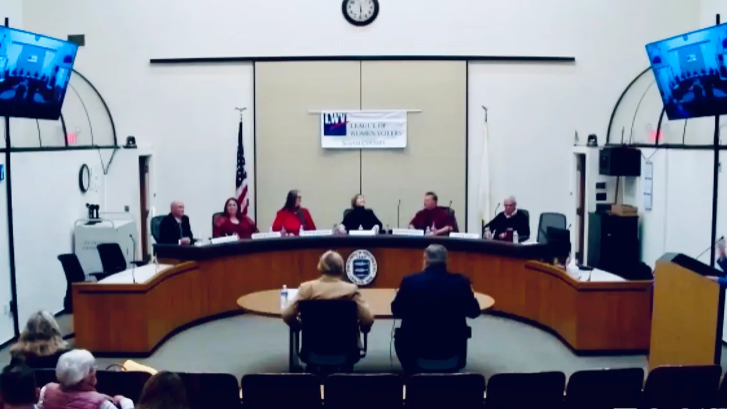
The Westerly School Committee is rewriting its Transgender, Gender Diverse, and Transitioning Student Policy. It is the only municipality in Rhode Island actively working to weaken the RIDE (Rhode Island Department of Education) policy that has protected all public school students in the state for seven years without incident. For this reason, I watched the League of Women Voters candidate forum on Thursday.
Westerly will soon elect four new school committee members. These members will be responsible for the school’s bread and butter, determining how money is spent and how the district can improve testing scores. They will also decide on what those involved in this forum described as “hot-button” issues.
Six candidates—three Republicans and three Democrats—are running for four open seats. The election is on November 5, and early voting has already begun. I’ve identified party affiliation with an R or a D. Corey Fyke, former managing editor of the Westerly Sun, moderated the forum. Though many issues were addressed, very little was said about the ongoing rewrite of the school district’s transgender student policy, but when asked directly if they endorsed the policies of Moms for Liberty, a group that has been vocal in opposing the current policy protecting trans students, the three Republicans passed on answering while the three Democrats said “no.” [Republican candidate Kristi Walston replied, “Yes, for parental rights. Other than that, I would pass.”]1
The following has been edited for length and clarity:
COREY FYKE: OUTLINE HOW PARENTS SHOULD OR SHOULD NOT INFLUENCE THE SCHOOL CURRICULUM.
Kristi Walston [R]: Parents should have access to the school curriculum. They should be able to review the school curriculum, however. We should trust our educators and administrators to choose or go over the curriculum coming from RIDE, but I believe in parental rights, and I feel [that parents] should have the last say as to what they accept for their students to learn.
Crystal Dawn Jackson [R]: Parents should be able to access and view the curriculum. It should be made available. We should always have the option to opt our children out of material that we deem is age-inappropriate for them.
Angela Goethals [D]: I don’t believe curriculum building is something I would feel qualified to do, even though I love my kids as much as the next parent. They are experts in building curriculums, and I trust them to do their jobs.
COREY FYKE: SOME CITIZENS ARE CONCERNED ABOUT THE APPROPRIATENESS OF READING MATERIALS BOTH IN SCHOOL LIBRARIES AND ON STUDENT COMPUTERS. DO YOU THINK THIS IS A PROBLEM? WHY OR WHY NOT?
Joseph Jackson [R]: I do think it’s a problem. A lot of people use the words book banning, and that immediately creates a divide between people. We’re not asking to have books banned. We’re asking to have books put in the hands of children that can contextualize what they’re reading. Books that contain explicit images and explicit sexual content don’t belong in the hands of elementary school kids. It’s not what you’re showing. It’s when you’re showing.
Peter Nero [D]: I agree there shouldn’t be anything that’s explicit that children are going to read at any grade level, to be honest with you, but we should be counting on our librarians and our teaching staff that they’re going to have the best judgment when they’re releasing a book to be read.
Timothy Killam [D]: I’m never going to support a book ban, period, but I agree with what Peter said. Our librarians are educated, they’re reviewing all the books, and they should be age-appropriate within the libraries.
Kristi Walston [R]: I believe that we should have books that are age-appropriate in our school libraries. Nobody is banning books here. They can be bought, picked up at the public library, and accessed in other ways, but in the school setting, they need to be age-appropriate based on not only the librarian’s suggestions but a lot of the books have inscriptions on the front of them or in the back of them that determine what age they are for. I have been looking into the books that are listed here in specific schools, and the middle school does have books that are not age-appropriate for every age in that school.
Angela Goethals [D]: I am not in favor of removing reading material. We started this forum by talking about the purpose of public school education, and I believe that it is for the broadest and most diverse amount of material. I’m not in favor of removing material, but I’m absolutely in favor if a parent has a concern about a certain book or books, they can have a conversation with their building principal and librarian and say, “My student will not read this book, this book, and this book.”
Joseph Jackson [R]: Not to dog pile on, Tim, but yes, kids are sneaky, and they are going to find ways to get things they’re not supposed to. A big part of our job as parents is protecting them from doing that. But that does not excuse the school from being irresponsible with what it’s presenting. I’m not going to reiterate my points. There’s a time and a place for everything, as Ecclesiastes says, so it’s just a question of timing. •
Full interview on Steve Ahlquist’s website, steveahlquist.substack.com